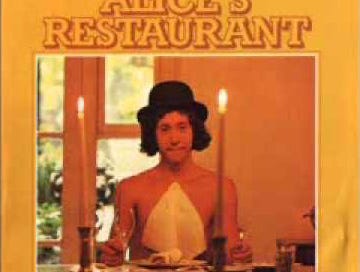“If you want to stop war and stuff, you gotta sing loud.” Gotta shout. Gotta be part of a movement. The “Alice's Restaurant Anti-Massacre Movement.”
“Alice’s Restaurant Massacre” was released in 1967. Height of the Vietnam War. Height of the antiwar movement. Before it all crashed to the earth. Dylan saw it happening, saw the fracture and the damage to come (On Highway 61 Revisited in 1965 ), but ‘67 still rang of hope. The Summer of Love. The March on the Pentagon. Hippie love and the power of youth.
I And the darkness. The fragmentation. It was there in plain sight. Not a creation of a mainstream that didn’t understand hippies, and has echoes in the faux antiestablishment ethos of the Trump movement. Joan Didion captured it. So did Hunter S. Thompson. And this was before the police riot in Chicago that was blamed on the hippies, before the election of Richard Nixon, or the murder of a fan by Hell’s Angels at a Rolling Stones concert in Altamont in 1969.
Arlo Guthrie sang the song in ‘67 about ending the war, but also about police overreach, and the absurdity of government power. The song touched a nerve, I think, because of its antiestablishment humor. I wonder, though, how much of its appeal now is about content, or whether its annual rotation on classic rock radio as “The Thanksgiving Song” is about nostalgia.
The song argues for activism, but in a jokey way that has a different meaning in 2024. We are deep in an era of conformity and obedience to authority, and a glorification of the military as an institution. The longstanding internal joke about military bureaucracy — see the novel M*A*S*H or Catch-22 — may still hold sway among active-duty military, but not in the broader public conscience. We see military service as noble in a way that is foreign to the ethos of “Alice’s Restaurant.” Its joke about the police as incompetent feels old, though Guthrie is prescient about police militarization. And its assault on conformity and unthinking trust in government has been coopted by Donald Trump and his followers who use it to attack modernity and our polycultural world.
If you want to end war, in Ukraine, in Gaza, you’ve got robbed. You’ve got to join together, work together. In a movement.
that’s what Guthrie — taking a page from his father, the great Woody Guthrie — tells us, with a smirk. I still hear it.
What do you hear in this song today?




